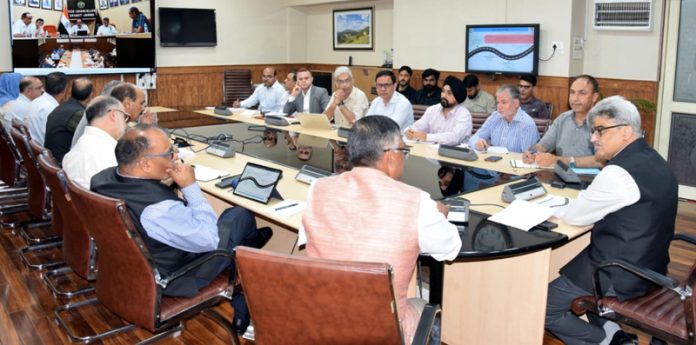Excelsior Correspondent
SRINAGAR, Sept 23: Chief Secretary, Atal Dulloo, today chaired a meeting of the Health Department to assess the progress on developing a comprehensive online Sehat App envisaging availability of all requisite healthcare facilities in a hassle-free manner.
Besides Additional Chief Secretary (ACS) IT Department, the meeting was attended by Director, SKIMS; Principal, GMC Jammu/Srinagar and other Medical Colleges; Director Coordination, Medical Colleges; Director, Health Services, Kashmir/Jammu; representatives from BISAG-N and other concerned officers of the department.
During the meeting, the Chief Secretary took a detailed review of all the components added, so far, in the app. He emphasised on making ‘Sehat App’ more comprehensive for both service providers and seekers. He urged the developers to take into consideration the future needs of the people in addition to the possible avenues that could be explored with the use of modern technology and Artificial Intelligence (AI) at present.
Dulloo asked for making it a one stop solution for extending every kind of support to the patients. He emphasised on including subsidiary details like bed strength, specialities, distance from current location and other diagnostic facilities available in each private or government health facility.
Dulloo further encouraged the BISAG-N, which is developing this app, to look into the possibility of API integration with many applications developed by some reputed healthcare facilities across the country so that these too are made available here without having to redo the same under this application.
Director Coordination, Dr Yashpal Sharma, threw light on the current status of the ‘Sehat App’ developed by the department in coordination with BISAG-N.
Moreover, the sub-categories like information about Health facilities, diagnostic installations, drug stores, patient appointments, emergency services, blood banks, De-addiction centres, advisories, health alerts are to be provided through this app. In addition, facilities like medical resources and references, journals, workshops & courses, higher education and training would be extended for healthcare professionals.
For medical and paramedical students the amenities like accommodation, course details, library facilities, would be made available. A helpline giving all important contacts and SoS facility is also in offing through this app.
Once completed, it will also have provision of enhancing capacity through online courses, trainings and study materials for the staff and other concerned health care providers, as was elaborated in the meeting.
Meanwhile, The Chief Secretary had a holistic assessment of steps taken by the department for successful implementation of the project. He enquired about the status of different verticals constituting this project along with their desired outcomes and scheme of their implementation over the years of the life of this intensive agricultural development across different sectors and areas of J&K.
Dulloo urged the implementing department to take proactive steps in procuring several critical items envisaged under this project for timely delivery thereby propelling the project further towards its success. He asked for enhancing the capacity of the allied staff along with taking only capable persons whose expertise would be pivotal in making the progress under it.
He suggested involving farmers and other private players in making FPOs promoting niche crops with active credit linkage and support by the financial institutions of the UT.
While speaking in the meeting, Principal Secretary, APD, Shailendra Kumar, apprised the chair of the current status of the Project Monitoring Unit (PMU) to be set up for implementation of JKCIP. He informed that the bid had been received for the same and it would be in place till September end.
MD JKCIP, Rahul Yadav, threw light on different steps taken by the department to implement this $217 Million IFAD funded project.
Trending Now
E-Paper


